MCAT
Kaplan University
Page 2 out of 96 results
Sort by
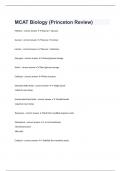
-
MCAT Biology (Princeton Review)updated already passed
- Exam (elaborations) • 43 pages • 2024
- Available in package deal
-
 BravelRadon
BravelRadon
-
- $19.99
- + learn more
MCAT Biology (Princeton Review)Maltose - correct answer Glucose + Glucose Sucrose - correct answer Glucose + Fructose Lactose - correct answer Glucose + Galactose Glycogen - correct answer Animal glucose storage Starch - correct answer Plant glucose storage Cellulose - correct answer Plant structure Saturated Fatty Acids - correct answer -Single bonds -Solid at room temp. Unsaturated Fatty Acids - correct answer -Double bonds -Liquid at room temp. Terepenes - correct an...
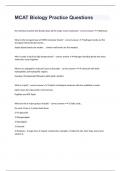
-
MCAT Biology Practice Questions with verified answers
- Exam (elaborations) • 55 pages • 2024
- Available in package deal
-
 BravelRadon
BravelRadon
-
- $19.99
- + learn more
MCAT Biology Practice Questionsthe chemical reaction that breaks down all the major macro-molecules - correct answer Hydrolysis What is the strongest type of INTER-molecular bonds? - correct answer Hydrogen bonds are the strongest intermolecular bonds.... diople-dipole bonds are weaker. . . Vander wall bonds are the weakest. Why is water a liquid at high temperatures? - correct answer Hydrogen bonding bonds the water molocules closer together. What is an ampipathic molecule? give an Ex...
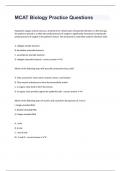
-
MCAT Biology Practice Questions well answered
- Exam (elaborations) • 48 pages • 2024
- Available in package deal
-
 BravelRadon
BravelRadon
-
- $19.99
- + learn more
MCAT Biology Practice QuestionsHyperbaric oxygen may be used as a treatment for certain types of bacterial infections. In this therapy, the patient is placed in a which the partial pressure of oxygen is significantly increased, increasing the partial pressure of oxygen in the patient's tissues. This treatment is most likely used for infections with: A. obligate aerobic bacteria B. facultative anaerobix bacteria C. aerotolerant anarobic bacteria D. obligate anaerobic bacteria - correct an...
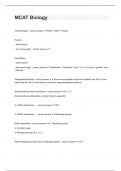
-
MCAT Biology questions with answers
- Exam (elaborations) • 72 pages • 2024
- Available in package deal
-
 BravelRadon
BravelRadon
-
- $19.99
- + learn more
MCAT BiologyCentral Dogma - correct answer DNA → RNA → Protein Purines - which bases? - how many rings? - correct answer Pyrimidines - which bases? - how many rings? - correct answer Remember: "Pyrimidine" has a "y" in it; so does "cytosine" and "thymine." Phosphodiester Bond - correct answer Joins one nucleotide to the next; between the 3rd C of one ribose and the 5th C of the other to create the sugar-phosphate backbone Directionality of DNA (convention) - correct ...
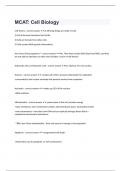
-
MCAT: Cell Biology correctly answered rated A+
- Exam (elaborations) • 7 pages • 2024
- Available in package deal
-
 BravelRadon
BravelRadon
-
- $13.49
- + learn more
MCAT: Cell BiologyCell Theory - correct answer 1) All living things are made of cells 2) Cell is the basic functional unit of life 3) Cells are formed from other cells 4) Cells contain DNA (genetic information) Are viruses living organisms? - correct answer No. They dont contain DNA (they have RNA), and they are not able to reproduce on their own (violates 3 and 4 of cell theory) Eukaryotic cells vs Prokaryotic cells - correct answer Eu: Nucleus. Pro: No nucleus Nucleus - correct ans...
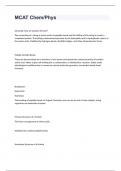
-
MCAT Chem/Phys questions n answers /passed
- Exam (elaborations) • 37 pages • 2024
- Available in package deal
-
 BravelRadon
BravelRadon
-
- $19.99
- + learn more
MCAT Chem/PhysGenerally, how are proteins formed? The connecting of a string of amino acids via peptide bonds and the folding of this string to create a completed protein. The folding is determined primarily by the hydrophilic and/or hydrophobic nature of the amino acids. Stabilized by hydrogen bonds, disulfide bridges, and other intramolecular forces. Peptide (Amide) Bonds These are formed when the n-terminus of one amino acid attacks the carboxy terminus of another amino acid. Water is ...
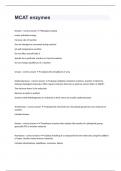
-
MCAT enzymes questions n answers
- Exam (elaborations) • 6 pages • 2024
- Available in package deal
-
 BravelRadon
BravelRadon
-
- $12.99
- + learn more
MCAT enzymesEnzyme - correct answer Biological catalyst Lower activation energy Increase rate of reaction Are not changed or consumed during reaction pH and temperature sensitive Do not affect overall Delta G Specific for a particular reaction or class of reactions Do not change equilibrium of a reaction Urease - correct answer Catalyzes the breakdown of urea Oxidoreductases - correct answer Catalyze oxidation-reduction reactions, transfer of electrons between biological molecules. ...
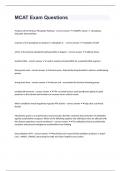
-
MCAT Exam Questions well solved
- Exam (elaborations) • 2 pages • 2024
- Available in package deal
-
 BravelRadon
BravelRadon
-
- $9.99
- + learn more
MCAT Exam QuestionsProducts of the Pentose Phosphate Pathway - correct answer NADPH, ribose- 5 - phosphate , Glycolytic intermediates reaction of G-6-phosphate to ribulose-5- phosphate is.. - correct answer oxidation of G6P where is the pentose phosphate pathway likely to happen - correct answer adipose tissue Southern Blot - correct answer used to analyze extracted DNA for a potential DNA segment Strong lewis acid - correct answer electron poor- fostered by being bonded to electron ...
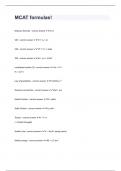
-
MCAT formulas!questions with correct answers graded A+
- Exam (elaborations) • 6 pages • 2024
- Available in package deal
-
 BravelRadon
BravelRadon
-
- $12.99
- + learn more
MCAT formulas!Distance formula - correct answer d=vt VAT - correct answer Vf = V₀ + at VAX - correct answer Vf² = V₀² + 2a∆x TAX - correct answer ∆x = v₀t + 1/2at² centripetal motion (2) - correct answer Ac = V²/ r Fc = mv²/ r Law of gravitation - correct answer F=GM₁M₂/ r² Newtons second law - correct answer Fnet = ma Kinetic friction - correct answer Fk = µkFn Static friction - correct answer Fs≤ µsFn Torque - correct answer t = F x r t = F...
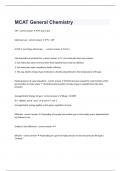
-
MCAT General Chemistry with 100% correct answers
- Exam (elaborations) • 29 pages • 2024
- Available in package deal
-
 BravelRadon
BravelRadon
-
- $17.99
- + learn more
MCAT General ChemistrySTP - correct answer 0°C and 1 atm Ideal Gas Law - correct answer PV = nRT At STP, 1 mol of gas will occupy ... - correct answer 22.4 L Characteristics of an Ideal Gas - correct answer 1. Gas molecules have zero volume 2. Gas molecules exert no forces other than repulsive forces due to collisions 3. Gas molecules make completely elastic collisions 4. The avg. kinetic energy of gas molecules is directly proportional to the temperature of the gas Partial press...

That summary you just bought made someone very happy. Also get paid weekly? Sell your study resources on Stuvia! Discover all about earning on Stuvia


